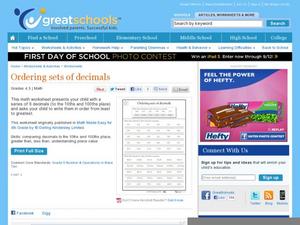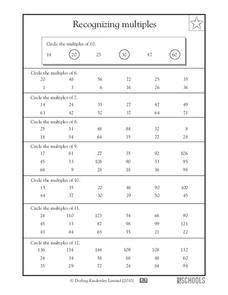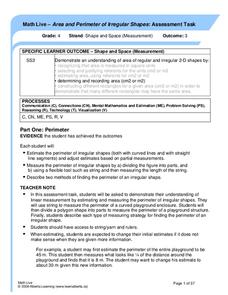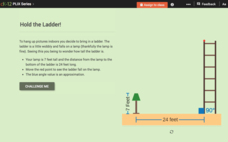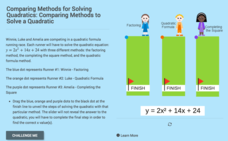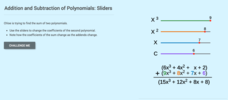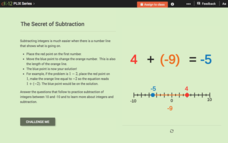Curated OER
Ordering Sets of Decimals
Practice putting decimals in order. This resource presents ten sets of decimals for kids to order. After working through the first five sets, they review measurement and unit conversion (kilometers and meters) in the next five problems....
Curated OER
Properties of Polygons, Parallel Sides, and Right Angles
Have fun with shapes! Third graders read a set of instructions and circle the shape in the description. They work on recognizing parallel sides and right sides. Use this resource as homework after your geometry lesson.
DK Publishing
Real-Life Word Problems, Part 2
Are you looking for word problems to fit into your Common Core math lesson? Use this resource to assess your third graders' problem-solving skills. They read 14 word problems involving multiplication and division, and write the answers...
Curated OER
Recognizing Multiples
Can your fourth graders recognize multiples of 10? What about 11 and 12? Use this worksheet to enhance your multiplication lesson, or to assess what your math students already know about finding multiples. Given six sets of numbers, they...
Curated OER
Sharing Treats
Most kids love treats, but they have a hard time sharing them! Reinforce both the value of sharing and the skill of division. Third graders divide up various snacks between kids, puppies, and bunnies. Tons of fun to solve and color, this...
Curated OER
Simple Subtraction ~ Take Away
What is 3 take away 2? Or 7 take away 5? Help your kindergartners learn the different ways to describe subtraction with a straightforward worksheet. Fourteen problems are written out for kids to solve, complete with spaces to write in...
Curated OER
Simple Use of Parentheses #3
Do your mathematicians know how to use parentheses in equations? Give them a activity to hone their skills in order of operations. They work out 20 simple problems involving parentheses, then choose which problem out of six adds up to a...
Curated OER
Times Tables Practice Grids #1
Could your third graders use some more times table practice? Complete these grids to reinforce the basics of multiplication times tables. A great way to bring all the times tables together with one instructional activity. Use this...
Curated OER
Verb Tenses
Discover how to use proper verb tenses with context clues. Five sentences help first graders decide if they should use -ed or -ing to end simple verbs. Each sentence provides context clues to indicate the time. Use the resource in...
Alberta Learning
Area and Perimeter of Irregular Shapes
Evaluate young mathematicians' understanding of area and perimeter with this series of three assessment tasks. Challenging students to not only calculate the area and perimeter of irregular shapes, but to explain in writing their...
CK-12 Foundation
Scientific Notation: Matching Numbers to Notation
Explore the conversion of numbers to scientific notation and back again. Learners begin with a matching activity to identify equivalent expressions. Then guiding questions test and extend their understanding.
CK-12 Foundation
Secant, Cosecant, and Cotangent Functions: Hold the Ladder!
Determine the length of a falling ladder. Pupils use an interactive to find the angle a ladder makes with the floor after it falls to answer questions. The scholars use the triangle formed in the interactive to determine values of...
CK-12 Foundation
Comparing Methods for Solving Quadratics: Comparing Methods to Solve a Quadratic
Determine the quickest process for solving quadratics. Pupils compare the number of steps in the process of solving quadratics using three different methods. Scholars determine which situations lend themselves to the different solving...
CK-12 Foundation
Addition and Subtraction of Polynomials: Sliders
Slide the coefficients to determine sums of polynomials. The interactive contains sliders to change the coefficients of an addend in a polynomial addition problem. Pupils determine the coefficients of the addend to arrive at particular...
CK-12 Foundation
Mineral Identification: Mineral Scratch Test
How can mineralogists tell a diamond in the rough from a chunk of table salt? Science scholars find out through an interactive that demonstrates the characteristics of minerals used for identification purposes. Topics include hardness,...
CK-12 Foundation
Angle Measurement: Adding Angles
Build angles from angles. Using the Angle Addition Postulate, learners find the measures of unknown angles. The interactive simulation shows a visual representation of the postulate and allows individuals to manipulate the angles and...
CK-12 Foundation
Properties of Real Number Addition: The Secret of Subtraction
Learners sometimes struggle to understand the concept of adding and subtracting integers. Help them see the why behind their answers using the interactive number line. The values change as individuals adjust the number line for each new...
Middle Tennessee State University
The Declaration of Independence: Its Legacy and Ideas in Today’s World
How is it possible that such an old document still triggers modern discussions? Teach scholars why the Declaration of Independence is still so important today using an informative resource. They watch various educational videos, work in...
Facing History and Ourselves
Why Little Things Are Big
Often our decisions are impacted by a fear of how others see us. That's the big idea in a two-day lesson that asks how false assumptions, how our fear of how others may see us, impact how we act. After watching a video about such a...
Facing History and Ourselves
Standing Up to Hatred on Cable Street
The final lessons in this section of the Standing Up for Democracy unit ask class members to consider ways they can help create a "more humane, fair, and compassionate environment" in their communities. For context, learners study how...
Facing History and Ourselves
Free Press Makes Democracy Work
A unit study of the importance of a free press in a democracy begins with class members listening to a podcast featuring two journalists, one from a United States public radio station and one from Capetown, South Africa. The lesson,...
Facing History and Ourselves
Bio-poem: Connecting Identity and Poetry
Writing a bio-poem is a great way to have young scholars go below the surface and reflect on who or what has made them who they are. Check out this richly detailed lesson that provides step-by-step directions for crafting a bio-poem.
Facing History and Ourselves
Mood Meter
Returning to in-class learning has proved to be a challenge for both teachers and learners. This series of 15 lessons provides instructors with ideas about establishing or re-establish classroom protocols and opening or closing routines...
Facing History and Ourselves
Compass Points
Needs, Suggestions, Excitement, and Worries. A Compass Points worksheet asks pupils to give feedback on that day's lesson. Learners identify what they need from the instructor and classmates, what excites them about the class, what...
